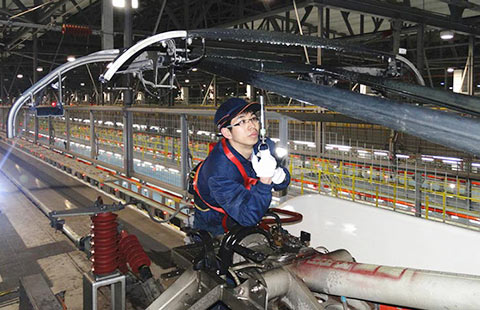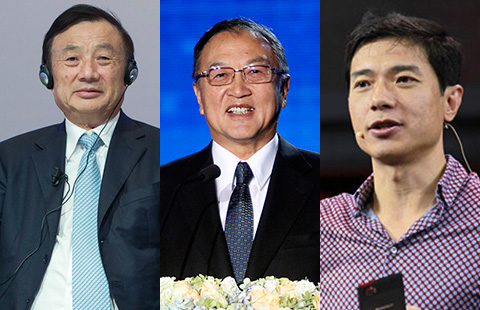Foreign firms 'will benefit from new industries'
By LAN LAN (China Daily) Updated: 2012-09-05 03:46Foreign companies will enjoy new opportunities with the development of the recently announced seven strategic emerging industries, such as environmental protection and new-energy vehicles.
Key products and services provided by the industries are being catalogued, Ren Zhiwu, deputy director-general of the Department of High Tech Industry at the National Development and Reform Commission, said in an interview with China Daily.
The catalogue, to be finalized shortly, will define the scope of the industries and list their products and services, Ren said.
According to a national development plan for strategic emerging industries during the 12th Five-Year Plan (2011-15), unveiled in July, the government wants the industries to generate 8 percent of GDP in 2015 and 15 percent by 2020. This is a marked rise from the 4 percent of GDP that they were responsible for in 2010.
Plans for energy saving and environmental protection, high-end manufacturing, new materials and new-energy vehicles have been issued. Plans for new-generation information technology, biotechnology and new energy are being examined for approval by the State Council.
Other reforms are in the pipeline, Ren said, such as low-altitude airspace management, the convergence of telecom, broadcasting and Internet network services and reform of the pricing mechanism and quota system for new energies.
The government will set up a special fund to boost emerging industry development.
The fund for this year is a 7.5 billion yuan ($1.17 billion) investment in innovation and strategic emerging industries allocated by the government in March, industry insiders said.
Together with investment in key scientific research projects and local fiscal investment, the total will be more significant, economists said.
More than 20 local governments have launched detailed plans to boost emerging industries between 2011 and 2015.
The Shenzhen government, for instance, has allocated 10 billion yuan for new emerging industries.
Local governments are designing a range of preferential policies, subsidies and loan arrangements.
Finance Minister Xie Xuren last month pledged to further support emerging industries through tax incentives.
Foreign opportunities
Davide Cucino, president of the European Union Chamber of Commerce in China, said European businesses are eager to contribute.
"Most of the technology involved is already in use in Europe. And the readiness of European business to invest in these sectors perfectly matches the need for further development in China," he said.
However, he also expressed concern that foreign companies would not be treated equally, regarding subsidies, financing and intellectual property rights.
But Ren pointed out that foreign firms would have numerous opportunities.
"Foreign enterprises are facing more opportunities and brighter prospects in China by fully utilizing China’s opening-up policy and the country’s diversified market."
The government has encouraged foreign investors to target industries such as biomedicine.
Further opening up to international cooperation is a must, said Feng Fei, head of the industry department at the State Council Development Research Center, a government think tank.
"Chinese companies and their foreign counterparts will have to create new models for business cooperation," he said.
Some Chinese companies traditionally took a "take-and-use" approach in research and development.
But they will have to play a bigger role in innovation as there is a technology shortfall in some new industries, such as electric car batteries where both Chinese and foreign companies have yet to make a genuine breakthrough.
Besides the huge and diversified domestic market and relatively low labor costs, foreign companies will also benefit from China’s advantage in "concentrating forces", which allows it to act more swiftly in infrastructure building, he said.
Many international companies have seen the new emerging industries and industry transfer from coastal areas to the interior as a pathway for future investment, said Zhang Changchun, director of the Institute of Investment at the National Development and Reform Commission.
Executives from more than 100 international companies including Siemens, Toyota, Ford and Motorola have recently visited regions such as Chongqing and Sichuan to investigate the investment environment, according to the Economic Observer.
The emerging industries provide a number of opportunities, and combating pollution is one of them.
US scientific instrument manufacturer Thermo Fisher Scientific has seen monitoring equipment sales rise.
China tightened air pollution monitoring standards and the Environment Ministry plans to build around 1,500 monitoring sites for the particulate matter 2.5 by 2015 with an estimated investment of 2 billion yuan.
Zhou Xiaobin, a commercial director of Thermo’s environmental and processing instrument division in China, said sales have risen sharply.
"Sales in the second quarter and the third quarter have soared," Zhou said.
lanlan@chinadaily.com.cn
- Alibaba needs to think big on world stage
- Jack Ma eyes acquisitions to weave his magic again
- PBOC injects yet more pre-holiday money into market
- China stops approving new coal mines
- Chinese tourists expected to become most powerful buyers in winter season
- China tops world in PV installation capacity
- Chinese Premier vows to deepen reforms
- China retains as Malaysia's largest trading partner in 2015
















